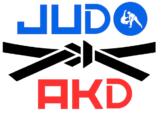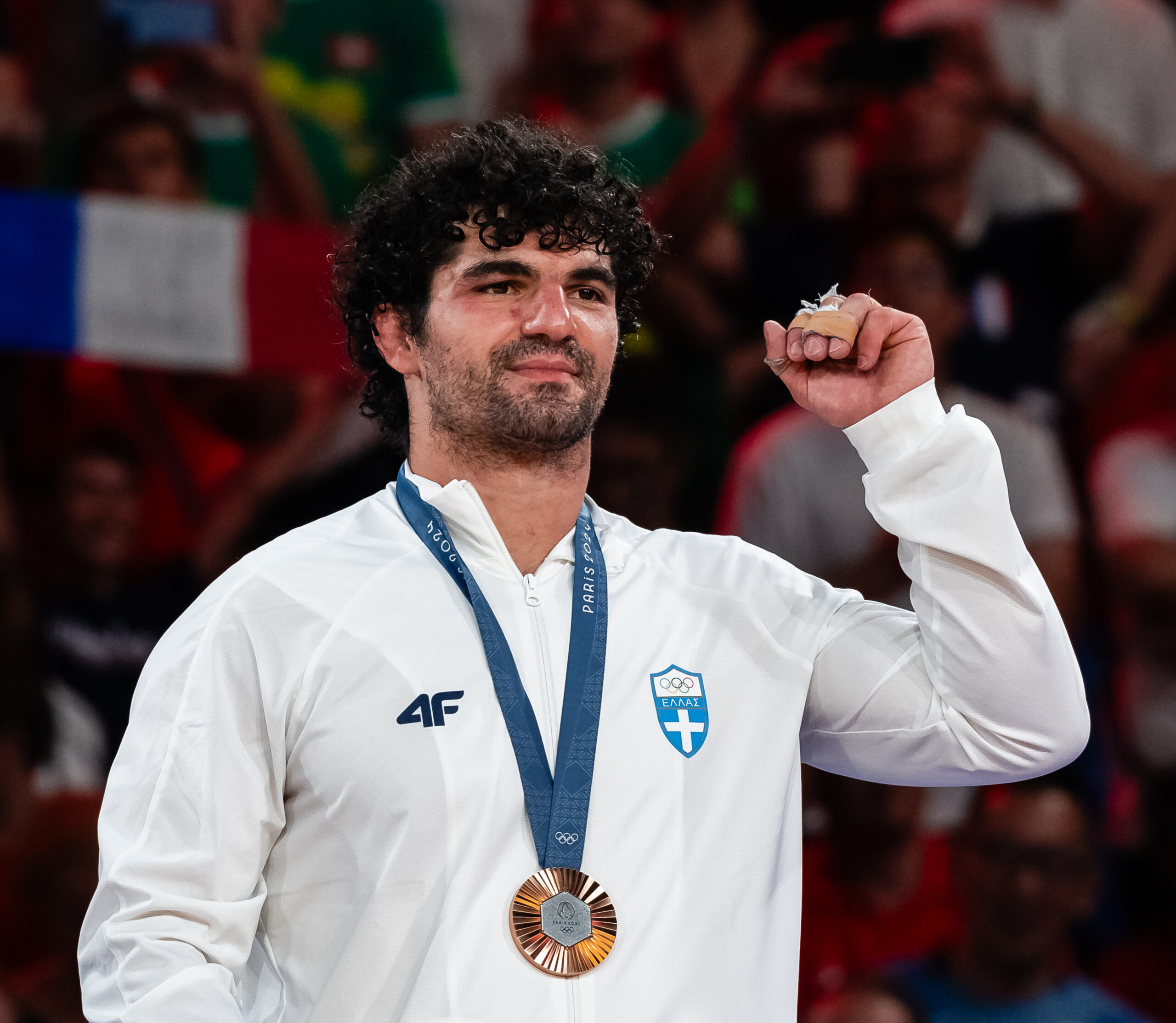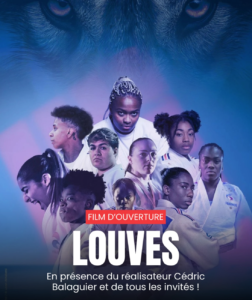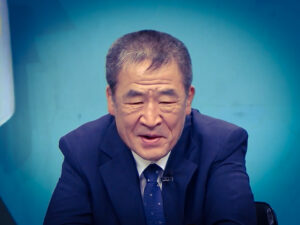Born Fiodor Nikolayevich Tselídi on August 5, 1996, in Vladikavkaz (North Ossetia-Alania, Russia), the Greek Theódoros Tselídis came to judo late, at fourteen years old. It was in 2011, the year of the coronation of his near-lookalike from Dagestan, Tagir Khaybulaev from the U100kg category, but also of the second of three world titles for Ilias Iliadis, his predecessor wearing the colors of Greece in the U90kg category. Born in Georgia under the name Jarji Zviadauri, the latter illuminated those Paris World championships with an aura and charisma rarely equaled. His right shoulder covered with a turquoise strap, he even allowed himself to play interpreter for half an hour for the author of these lines during an interview in the warm-up area with Azerbaijani Elnur Mammadli, Olympic champion in the U73kg category at the Beijing Games. The conversation, in three-way ping-pong mode in Russian and English, ended with a friendly discussion about our recent respective fatherhoods. Then Ilias asked that legendary question: « Is that good? Do you have what you need for your interview with Elnur? Because they’re calling me on the microphone for my semi-final… » A World championship semi-final, no less. It was approached with such composure by its defending champion that its outcome could only be iconic. After teasing him by grabbing Japanese Takeshi Ono’s headphones and dancing to his favorite song in the call room just before the other semi-final of the category, Iliadis threw Russian Kirill Denisov with a masterful ura-nage, punctuated by a huge smile and a mime of a baby being cradled in his arms. Like a nod to our three-way exchange a few minutes earlier.
Why tell this anecdote? Because the meeting that preceded the exchange below also took place in the context of a three-way interview. And, as in Sir Arthur Conan Doyle’s famous eponymous short story, the role of ‘The Greek Interpreter’ was central to it.
We are in May 2025, heading to the warm sun of Benidorm (Spain), as part of a profile of Russian Inal Tasoev for the French weekly L’Équipe Magazine. A few minutes before boarding the plane, a text from Tasoev’s assistant gives us the contact details of the person who will provide translation on site. It is Theódoros Tselídis, Olympic medalist in the U90kg category at the Paris Games ten months earlier.
The interview goes wonderfully. Beyond the obvious complicity between the two Ossetians, there is the same thoughtfulness for the comfort of photographer Ali Sallusti and myself. Water bottle, chair, shade, the two men inquire about everything. Yet it was they who, a few minutes earlier, had come out dripping with sweat from training. The next day, an additional photo session, a double handshake, and a promise made to Theódoros to meet again later, further away and in more detail… A summer has passed, the time has come. – JudoAKD#042.
A French version of this interview is available here.
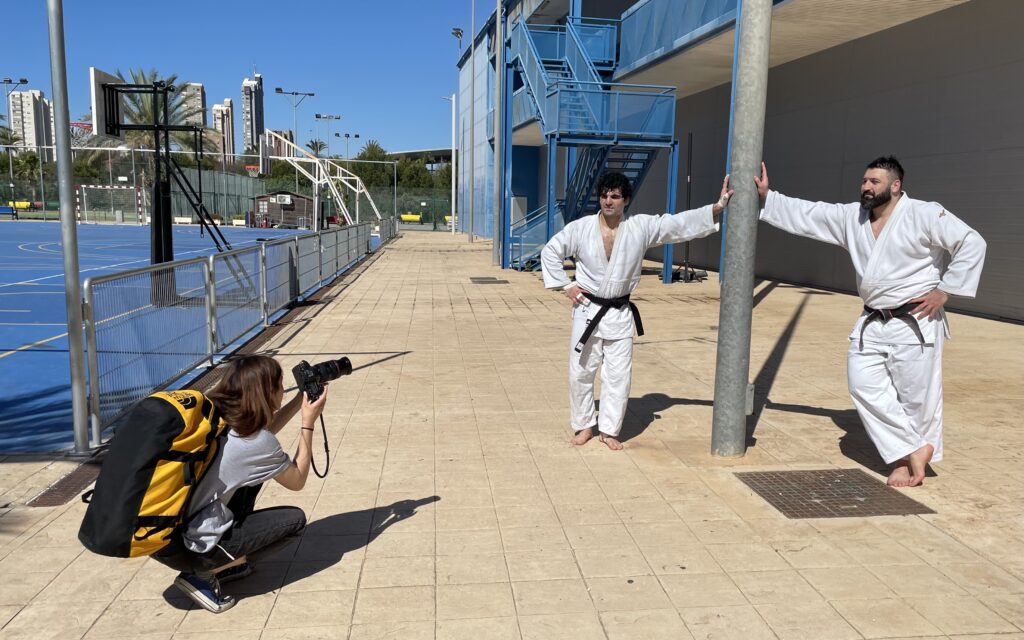
What does this summer of 2025 inspire in you? Usually, the entire circuit chains together training camps for World championships or the Olympics. And this season, it’s almost like a big holiday for everyone…
We agree. It’s the first time I’ve noticed such a big gap between competitions, yes. The first year after the Olympics, most athletes take a long break, me first. Besides, if you look at the results of the last World championships, you’ll see that most of the guys who shone at the Olympics were beaten early. Only a very small minority managed to take a medal again, I’m thinking of Frenchman Gaba or Japanese Murao or Nagayama, for example. Or my friend Zelym Kotsoiev. The others, the Heydarovs, the Turoboyevs, all went down quickly…
Alright, let’s rewind a bit. The first time I notice you, it’s in Tel Aviv, at the 2018 European Championships. You seem to arrive from nowhere and yet you climb onto the U90kg podium. Fact-checked on JudoInside, you’re twenty-one years old then and have only done one tournament on the World tour so far, a month earlier at the Tbilisi Grand Prix. Question: where were you, the first twenty-one years of your life?
[He laughs] That’s true… I was born in Vladikavkaz, in North Ossetia-Alania. I started judo there, in 2011. I was fourteen years old. I competed in the Russian championships as a cadet, junior and U23, but never managed to take a single medal. I wasn’t part of the national team in those age categories and it made me a bit desperate because I had this desire in me to fight and to progress. But I had the option to fight for Greece because I’m also Greek through my family. Put yourself in my shoes, after so many defeats as a cadet or junior I said to myself: okay, maybe I’ll progress faster if I start doing international competitions for Greece. So I said to myself, alright, the upcoming Russian senior championship will be my last, then I’ll try with Greece. And guess what?
What?
Well, I manage to take the silver medal in seniors! I never managed to win a single medal at the Russian championships, whether as a cadet, junior or U23, but in seniors I win the silver medal!
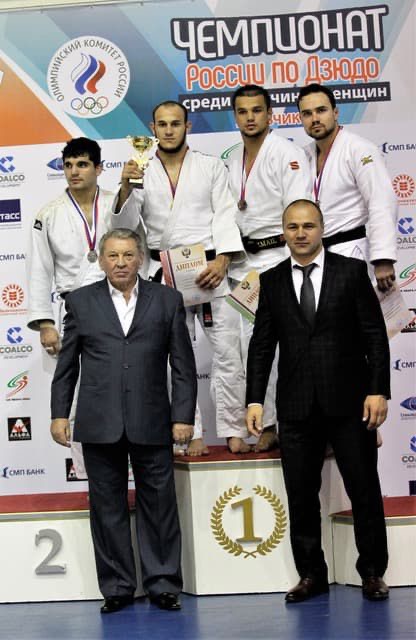
So here you are potentially eligible for the Russian national team?
I can go to the Russian team or the Greek team since I also have that citizenship… In fact, Russian national coach Khasanbi Taov calls me to go to the Tbilisi Grand Slam. I’m really embarrassed because, not thinking I’d get this result, I had already committed to the Greek team.
How do you handle this situation?
I lied. It’s not good, I know, but in the moment I lied. I told him I was injured. It wasn’t until later that I ended up calling to apologize and announce that I had committed to Greece. They wished me good luck and I was able to turn to Greece.
How did the discussions with Greece go?
I had called Nikos Iliadis, the coach. I told him I was also a Greek citizen, that I wanted to fight internationally and that if there was a possibility for me, it would be perfect. He immediately said yes and immediately registered me for the Tbilisi Grand Slam, in April 2018. It’s my very first international competition. I had no experience at this level before that, apart from some regional tournaments in Russia or the Russian championships. Here I am as the dark horse. Nobody knows my style, nobody knows who I am. Deep down, a great desire to show what I’m worth. Hence this European medal in my second international outing.
Yes, it’s a surprise for all the observers present. Was it easy to change nationality? Sometimes the training country can require you to wait three years, for example.
In my case, it’s different because I only entered the national team at the end of 2017, after the Russian championships. And I’ve never even fought internationally for Russia. The rule you mention concerns athletes who are already fighting internationally for a country. That wasn’t my case and that’s why I was able to go without that famous three-year « quarantine. »
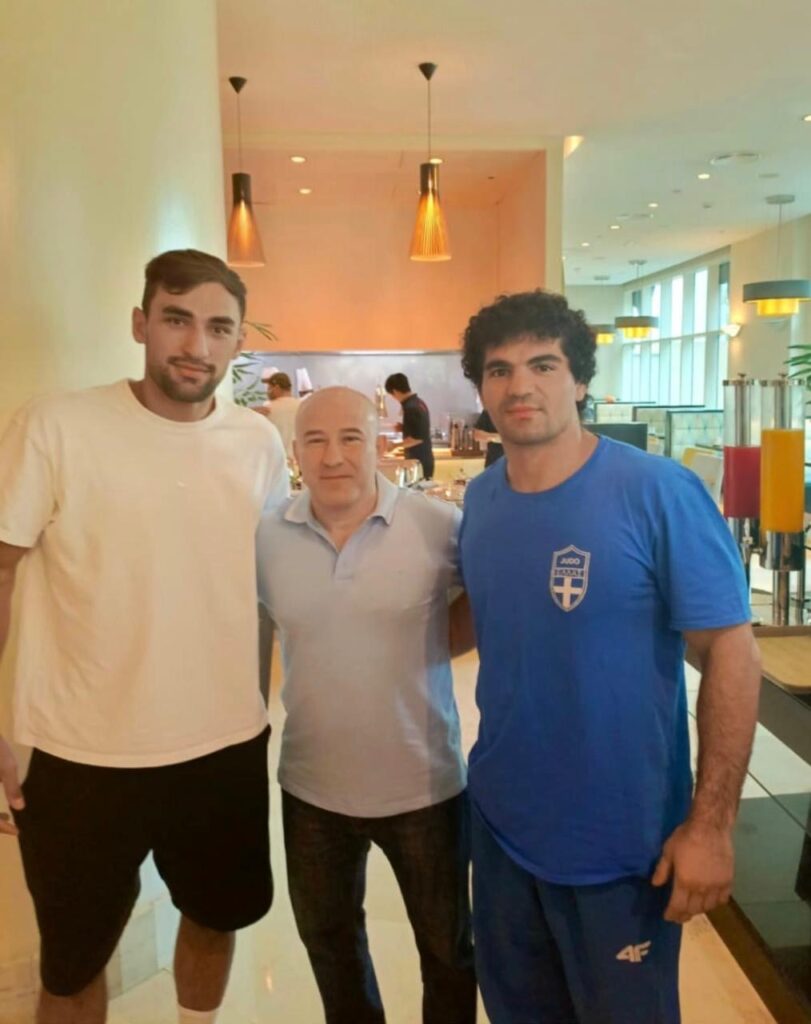
You say you started judo at fourteen. That’s quite late…
Yes, but I adapted very quickly because I was physically prepared. Before judo I did two years of wushu and six years of taekwondo, where I was a red and black belt. These disciplines helped me a lot for judo. We did a lot of stretching and that gave me great leg flexibility.
It’s funny because I recently interviewed the O100kg Temur Rakhimov from Tajikistan. He also started with taekwondo…
Oh yeah? He has the profile of a guy who comes from taekwondo, I can confirm [smile]. He’s very tall. They need tall guys with long legs… I was a bit different. It wasn’t a good sport for me because I have short arms and short legs. Judo suits me better.
Is the fact that you didn’t manage to join the Russian national team related to having been a contemporary of heavyweights like Mikhail Igolnikov, for example?
I’m indeed from the same generation as Igolnikov and I can confirm that he was always tough competition. There were also other very strong guys. So I lost often. I must have placed seventh at the Russian junior championships, or at best fifth. In any case, I never managed to join the national team… But ultimately that may have been a blessing in disguise. If I had fought for the Russian team as a junior or U23, I probably would have had to wait three years before being able to defend Greece’s colors – and maybe I would have even given up. For me, everything worked out perfectly in the end.
You weren’t competing internationally, but were you training with the national team in Sochi, for example?
I did two national training camps, one when I wasn’t on the team and the second when I had just joined it… Just before my departure, so.
And so you have this thunderous start in 2018 with this first European medal in your second international outing. Once the surprise effect wore off, things seem to have gotten a bit tougher. You have to wait until the Europeans in Sofia, in 2022, to once again taste the joys of a continental podium. Why such a long wait?
After the 2018 Europeans, I still get a few medals. But quite quickly my rivals start to adapt to my style. I start losing like three or four competitions in a row. It’s something new for me internationally and I feel a bit lost. On top of that we go to the Mittersill international training camp where, unfortunately, I seriously injure my knee. I have surgery and find myself unable to compete for nearly a year. And just a few months after my return, the pandemic sends us all home… In fact, it’s not until two years after the injury that I start to feel that this convalescent leg is mine again. Little by little, confidence in my abilities returns. Until the Sofia Europeans where, four years after Tel Aviv, I finally climb onto a new continental podium. That day, I’m happy and proud of myself. Aware both of how far I’ve come and all that I still have to accomplish.
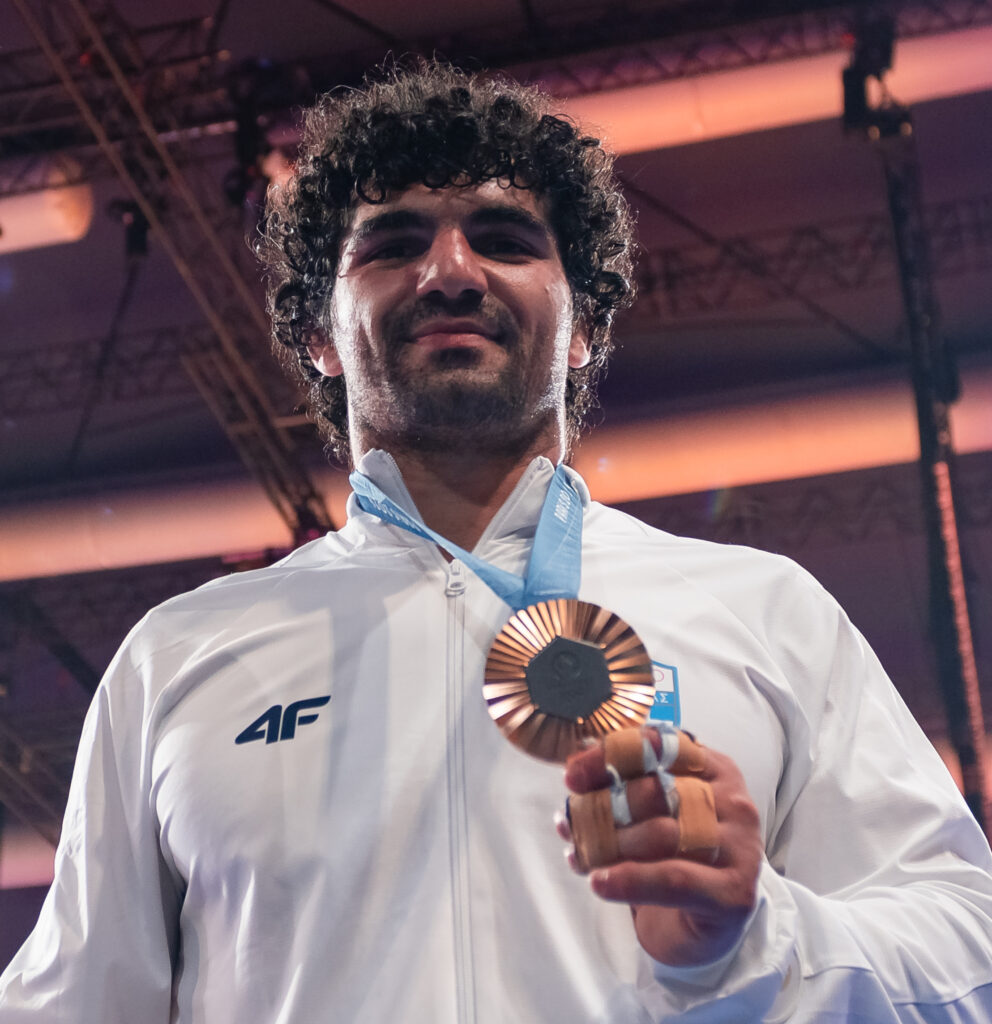
You have a degree in International Political Economy. Is it in this context that you learned to speak English so well?
In my faculty, English was the main subject, yes. But even before that, I had a tutor. My mother has always been very strict about it: you do what you want, but at least give yourself the means to communicate in English. It’s the main subject for the world economy. I could choose either French, Spanish or English, but I chose English because I already knew it a bit. But soon, maybe I’ll also start studying French because it’s a language that has always attracted me. And my mother loves France, she always told me « you must know this language ».
Where does this attraction come from for her?
She was raised in the Soviet Union. In the Soviet Union, most of the films shown were French films. That generation grew up less with American culture than with French culture.
Russia, English, France… What about Greece, then?
In Vladikavkaz, where I live, there’s a large Greek community. There’s even a club where you can study Greek. The problem is that the classes fell right when I had training, that is to say generally around six in the evening. The first years, I only made brief trips to Greece, mainly for documents and a few competitions. The rest of the time I was preparing in Russia even though I was fighting for Greece. Which didn’t give me many opportunities to learn Greek.
Did you experience the same moment of solitude that Ilias Iliadis experienced a few minutes after his Olympic title in 2004 in Athens when, interviewed live by the television of his adopted homeland, he had to admit that he didn’t yet speak the language?
Yes, when receiving my medal at the Paris Olympics I could only communicate in English or Russian with the Greek media. I felt a great sense of shame about it. It was from that day that I made the decision to start studying Greek very seriously. Since then I’ve been taking classes three times a week… I started from scratch but you have to understand that until then it was either training or Greek classes. There was no other option.
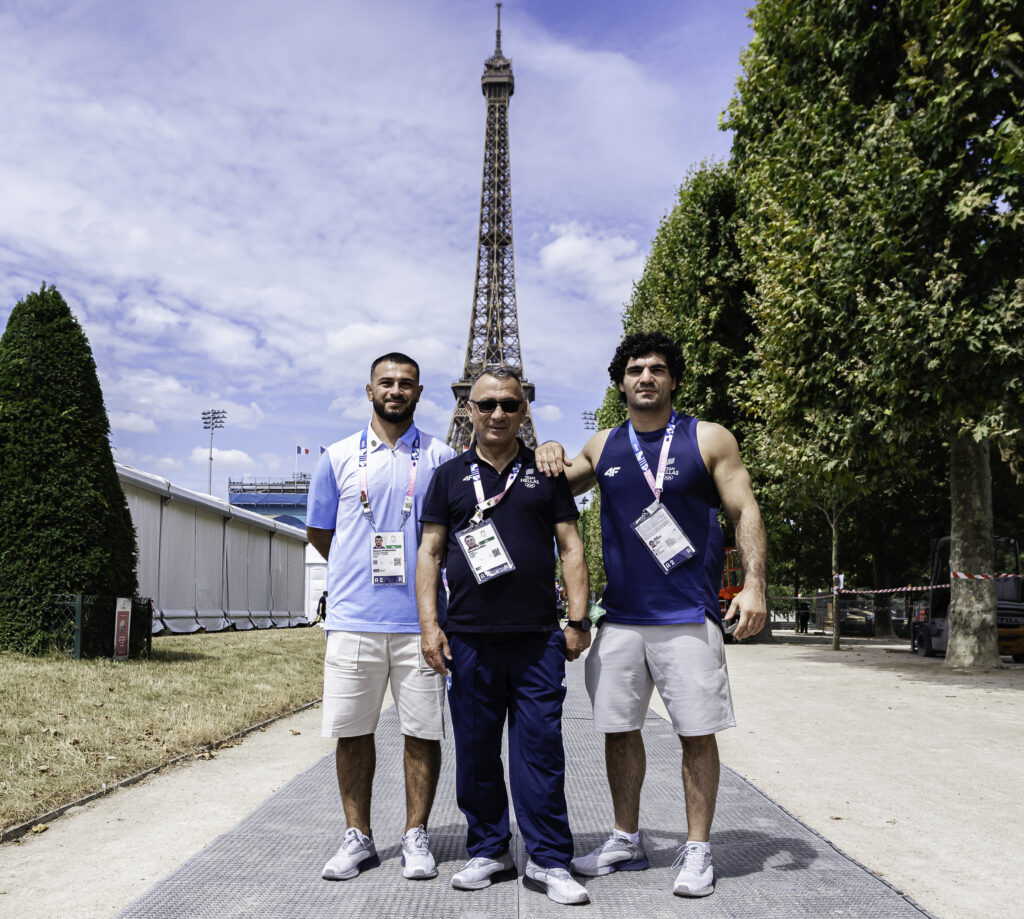
How did the COVID period go for you? Did you experience it in Russia or Greece?
I stayed in Russia. It was a difficult period for judokas because we had to try to stay ready and competitions were being canceled one after another. I stayed at home and thank God I have a small gym at home, so I just trained there… When competitions resumed, we were quarantined several times, and this deprived us of precious points in the final stretch for the Tokyo Olympics. At the Tel Aviv Grand Slam, for example, in February 2021, half of my plane ended up in quarantine for having traveled with a guy who was sick. I also missed the Tbilisi Grand Slam because I had a temperature. These two competitions were crucial for getting points. Even though my injury had kept me away from the mats for a long time, I still had a chance to go to the Games but COVID made things very complicated for me. It wasn’t easy to live through.
Today do you live mainly in Ossetia or Greece?
It’s 50-50 now. When I need to train, I favor Vladikavkaz. It’s one of the best clubs in Russia. We now have a two-time O100kg World champion in Inal Tasoev, as well as an Olympic champion and World champion of the U100kg category for Azerbaijan, Zelym Kotsoiev. We also have 2017 European champion Alan Khubetsov, as well as his great rival from that era, two-time European medalist Aslan Lappinagov. And then we especially have Tamerlan Tmenov, the heavyweight legend, two-time Olympic medalist, four-time World medalist and seven-time European champion. For me it’s better to train there.
You were fifteenth in the World ranking before the Paris Olympics. Were you afraid of not qualifying?
I had doubts, yes, especially after having already missed the Tokyo Games. I qualified in the final stretch. I had a good period after my 2022 European medal, but quite quickly my results became irregular again. I had to wait until March 2024 to win my very first Grand Slam title in Tashkent. This victory gave me back the confidence I had been chasing for long months. Right after that I got on the podium again at the Tbilisi Grand Slam and that’s when I knew it was going to work out for Paris. I knew I wouldn’t be the favorite but in my head it was: if I go at the last moment and I’m in shape, maybe I can become the dark horse and surprise everyone. That removed any unnecessary pressure from me.
Including from Greece? Because the last time the country had a U90kg at the Olympics, it goes back to the Rio Games with Ilias Iliadis…
It’s a different story, at the time of the Paris Games. In Greece, the attention is especially on my colleague Elisavet Teltsidou in the U70kg category. She was then European vice-champion, fifth at the World championships and number one in the world ranking. For the Greek media, she’s the favorite for the Olympics… unfortunately.
Why unfortunately?
Because I think these expectations from an entire country put too much pressure on her. She lost in the first round against Gabriella Willems. Admittedly, the Belgian has always given her trouble but I’m convinced that without all these expectations she would have gone for that Olympic medal.
Did the fact that you both competed on the same day contribute to lightening the pressure on your shoulders, proportionally to hers?
Completely. All the attention was on her and that was perfect for me. Honestly, I would have been quite unable to handle the expectations that were on her shoulders.
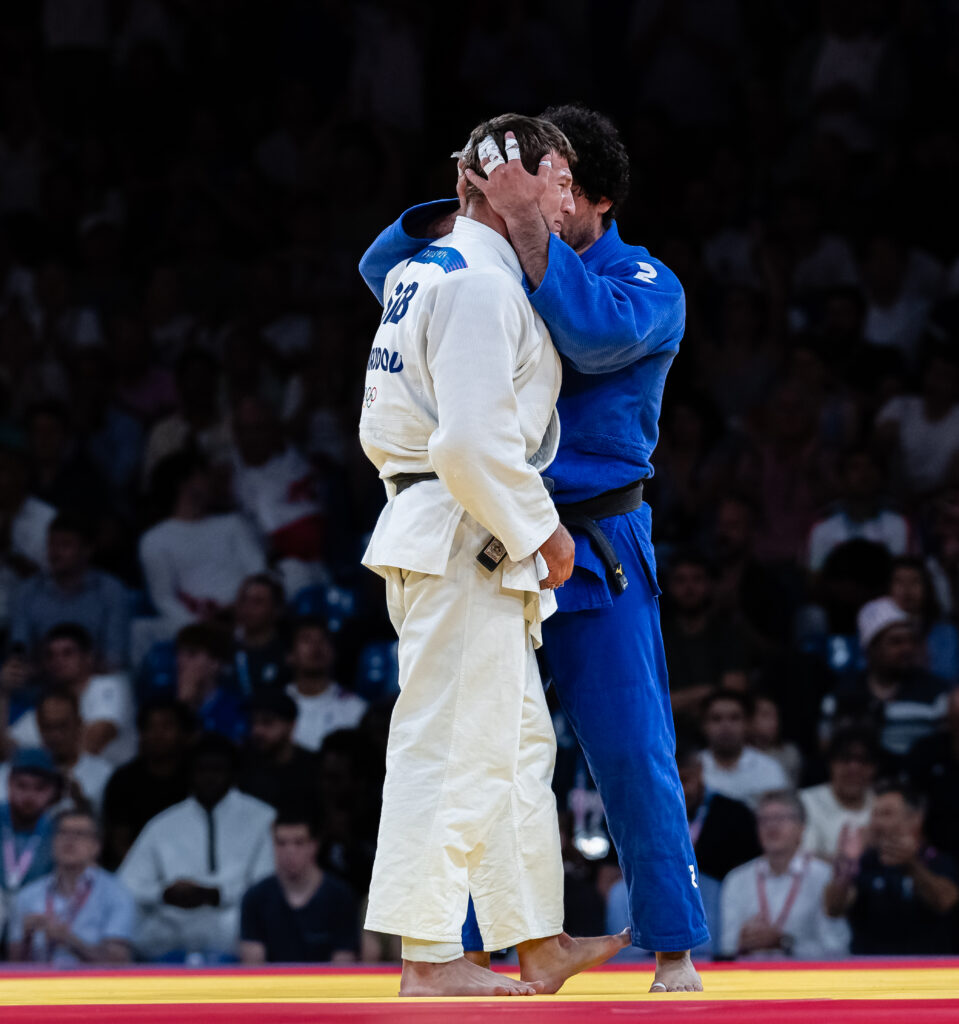
In Paris, on July 31, 2024, you deliver. There’s notably this difficult fight with Nemanja Majdov where the Serb ends up furious with the refereeing and which will earn him a suspension afterwards for crossing himself before stepping onto the mat… And then there’s this quarter-final with Maxime-Gaël Ngayap Hambou, the Frenchman. Did you expect to see him at this level, that day?
Honestly, yes. I had trained with him at the Tokyo training camp and I already felt that this guy was very strong. Very strong and also « crazy, » but in the positive sense of the term, like someone who fights with his heart. In fact, right after he beat Georgian Bekauri at the 2023 Paris Grand Slam, I said: this guy for sure they’re preparing him for the Olympics because he has all the abilities. And since, as the host nation, his category was automatically qualified for the Olympics, they started to hide him. He didn’t fight much until the Games, and tactically it was a perfect strategy. Even though France also had Alexis Mathieu, who is also super strong and very technical, they still chose Maxime-Gaël. And you see in Paris, he shocked everyone. But I expected it from him.
Yes and he doesn’t seem to be content with this Olympic podium since this season he took silver at the Podgorica European Championships.
It confirms that it wasn’t just luck at the Olympics. Besides, why do they choose him? I think that both he and Joan-Benjamin Gaba were the best choices, because at the Olympics you need courage and confidence in yourself to go get the medal, and both have the character for that. And then look at Gaba: in one year he took two European medals, two Olympic medals and World gold. And only one Grand Prix medal, besides that. So he’s the guy for the big championships, like Maxime-Gaël. They have that character. They’re fighters. Now the fighting spirit is the most important thing in judo, especially at the Olympics. Not being afraid of yourself and giving your full power on D-day, even favorites fail at it.
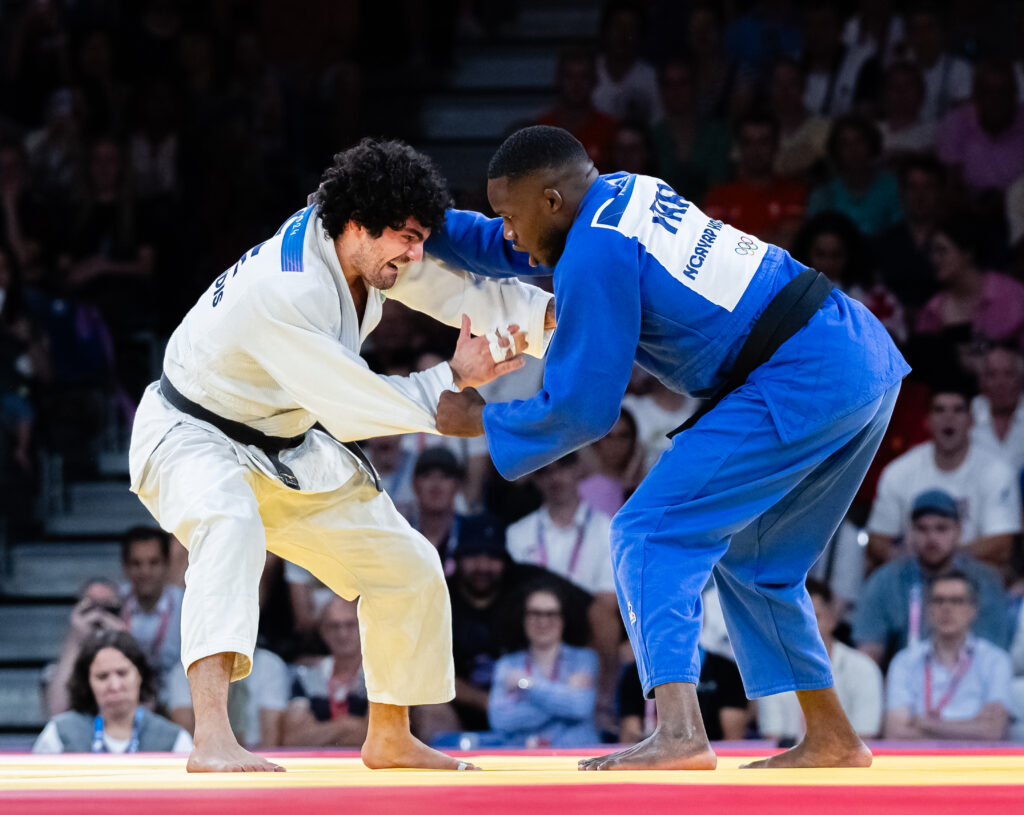
When you lose against Maxime that day at the Olympics, how do you remotivate yourself for the repechage, afterwards?
I tell myself that it’s not this defeat that matters, at that moment. It’s the Olympics, the most important competition. If I start to feel sorry for myself about this defeat, then I’m going to lose the repechage and the Olympic medal too. It’s just not the time to be negative, actually. So I immediately forgot about it, I told myself that I’d have plenty of time to think about it later. Right now, I have a unique chance to take an Olympic medal and I want to go for it completely. For that, I need to fully concentrate on my repechage and my fight for bronze. The defeat against Maxime, I removed it from my mind. I lost? I lost, too bad. I had five minutes of anger, no more. After that I completely switched and concentrated on the two fights that still separated me from the bronze medal.
Did knowing that your friend Inal Tasoev was in the stands comfort you?
That also contributed to making this day special… You know, when we learned that Russia wouldn’t go to the Olympics, we were at a training camp in Spain all together. Zelym Kotsoiev and I, we saw Inal’s despair and how he immediately stopped training. We didn’t even dare look at him. When we returned to Vladikavkaz, same thing. We didn’t try to communicate with him because he was very disappointed. He was angry and devastated… But after a while he told us: « Guys, I’m going to come to Paris to support you. » If he came, basically, it was for Zelym and me. For me that was a turning point, especially since he also told our entire group that he was convinced that I will come back with a medal. This confidence he placed in me helped me a lot mentally. He was behind me in every fight. Every time I stepped forward for a fight, I looked for him in the stands and I also always heard what he said. The only time I couldn’t hear what he was saying to me was against Maxime-Gaël. All the French were encouraging him. The noise was deafening and I couldn’t hear anything… Inal is someone who is able to calm me down with one word. And in that fight against Ngayap, I couldn’t hear what he was saying to me. I made a mistake and I lost.
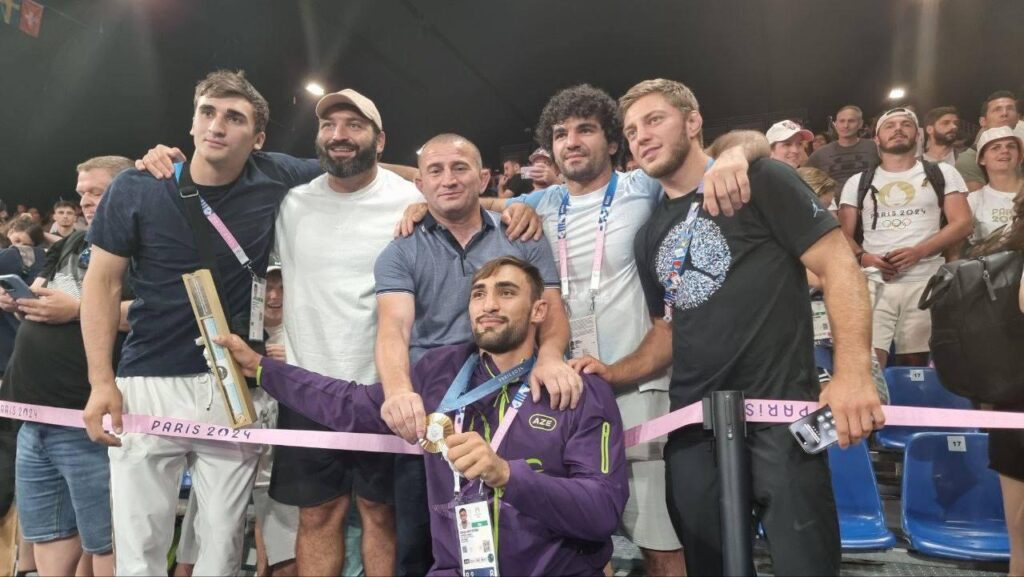
Did you talk again for the repechage?
Yes. Just before the fight for bronze, Inal came to find me in the warm-up area. It’s an interesting story, actually.
Go ahead, tell me…
He didn’t have accreditation but one of the people managing access recognized Inal and let him in. That’s how he was able to motivate me for the fight for bronze.
What did he tell you?
I was facing the Spaniard Mosakhlishvili. Inal told me: « You’re not the favorite so all the pressure will be on him. You don’t have to worry. Stay calm and let him feel the pressure. Everyone expects him to win the medal. You just have to fight the way you know how and you’re going to win. For you it’s nothing but a fight like any other. So just: fight, and you’re going to take the medal. »
How did you receive this advice?
His words gave me the calm and serenity I needed. And ultimately that’s how it went. The Spaniard had the pressure. Not me. That’s why I was able to fight better.
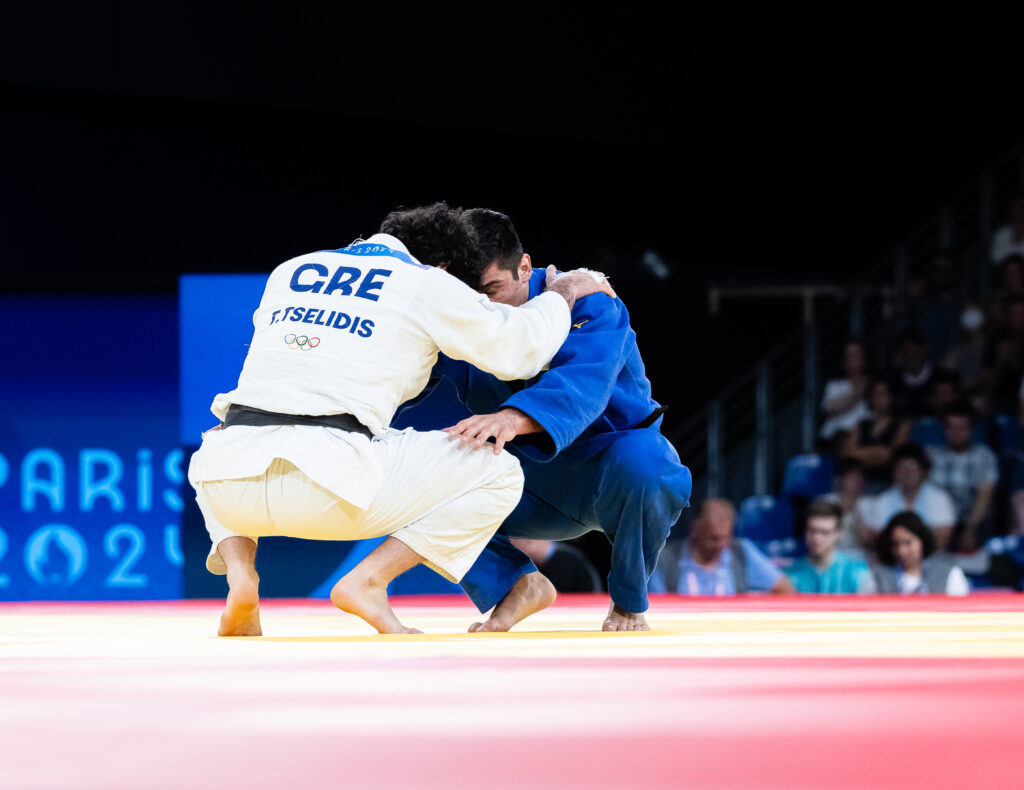
How did the return from the Olympics go? Did you go back to Greece or to Russia first?
I went back to Greece. It was crazy. I was very lucky because it was the first medal for Greece in these Olympics, and after that for about three days there was no other Greek medal. So I was at the center of attention and it allowed people in Greece to better discover who I was… The welcome was huge. There were cameras, TV, and even the Minister of Sports came to meet me. It was a very great honor for me.
How does the return to earth go, afterwards? Is it easy to get back to training or is the motivation so-so?
My career until then had been quite difficult with injuries and with the change of country, notably. And, since I hadn’t managed to qualify for Tokyo, I didn’t rest. Not even one day. I immediately resumed training. So after Paris I was coming out of almost eight years of training without rest… I said to myself: there’s zero chance I’ll fight again this year. Right now I just need to have rest, a big rest. Psychologically I was just exhausted.
How long did you take off?
I stopped training suddenly, until January. I didn’t even go to the gym. I couldn’t. Mentally and physically. And I gained a lot of weight, intentionally.
How much?
I went up to 105 kg.
Oh yeah, you didn’t do things by halves!
I quickly became a fat guy, yes. But afterwards, of course, when I calmed down, when I felt that I finally wanted to fight again, I started training very slowly starting in January, I think. This year, I knew I wouldn’t have serious results because judo is judo. For me, the most important thing this year was just to lose my weight. Now that things are better in that regard, I’m starting to prepare seriously again for what’s next.
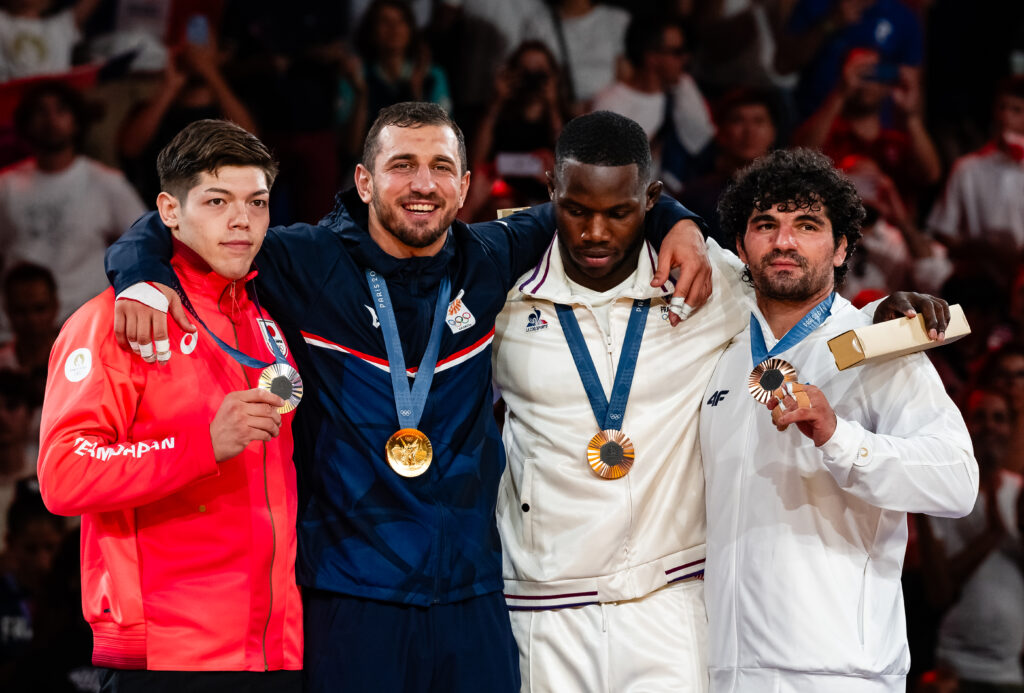
We talked a lot about Ilias Iliadis. Are you in contact with him?
Of course. In judo, he’s a role model for a lot of people, not just for me. As soon as I started judo, a guy came to see me and told me: if you’re Greek, you need to know that there’s a guy from there who is incredible. So I googled him and the truth is I was in shock. What a beast! And from that first day he became my favorite judoka.
You met, I presume. How did it go?
I was almost stunned. I couldn’t say anything because I was in shock, like Ilias is here and he’s talking to me, really. I discovered someone very humble and he helped me a lot during my career. When he was coaching in Uzbekistan, he invited me to come train there. He was very hospitable to me there. His advice contributed to giving me even more experience.
When he came to France for the first time for a masterclass at INSEP, I had the chance to be his partner and his translator. I had the image of a judoka all about power and I discovered a perfect sense of positioning.
People think he’s more strong than technical but I always thought the opposite. Of course, he had insane power, but also he felt judo a lot, a lot, and had very big throws like standing seoi nage like Koga. It’s very difficult to counter him. And then he has such confidence in himself. I think it comes from within. Like, he was born for this. And he feels that he was born for this.
Do you do masterclasses yourself?
I started recently, after the Olympics. In Greece, I took part in quite a few demonstrations for children. Right after the Budapest World Championships, I was invited to Slovenia with other athletes like Canadians Christa Deguchi and Kyle Reyes and Japanese Kiyoshi Harasawa. We gave a masterclass there and I really enjoyed the experience. We’ll see if other opportunities present themselves. I have unconventional judo, it’s always interesting to explain it to people.
Do you have sponsors who follow you in your career?
Yes, especially since the Olympics. In Greece, you have to find sponsors. It’s something new for me who was used to the Russian system where everything is taken care of by the government, the army or the police. In Greece, you have to find sponsors yourself. The medal at the Paris Games helped me in that it allowed me to sign with two sponsors, the National Bank of Greece and Stoiximan, an online betting organization. It makes life much easier for me. I have much more motivation to train because now I feel economically better. I think it will help me get better results on this cycle towards Los Angeles. I won’t have to worry about what I need to do to make money. I’ll just be able to focus on training.
And your federation is under contract with Fighting Films, right?
Yes, and we’re going to fight in Fighting Films judogi. You know, with Greece, it’s a big story with this equipment manufacturer, because Ilias was the ambassador of Fighting Films for a long time.
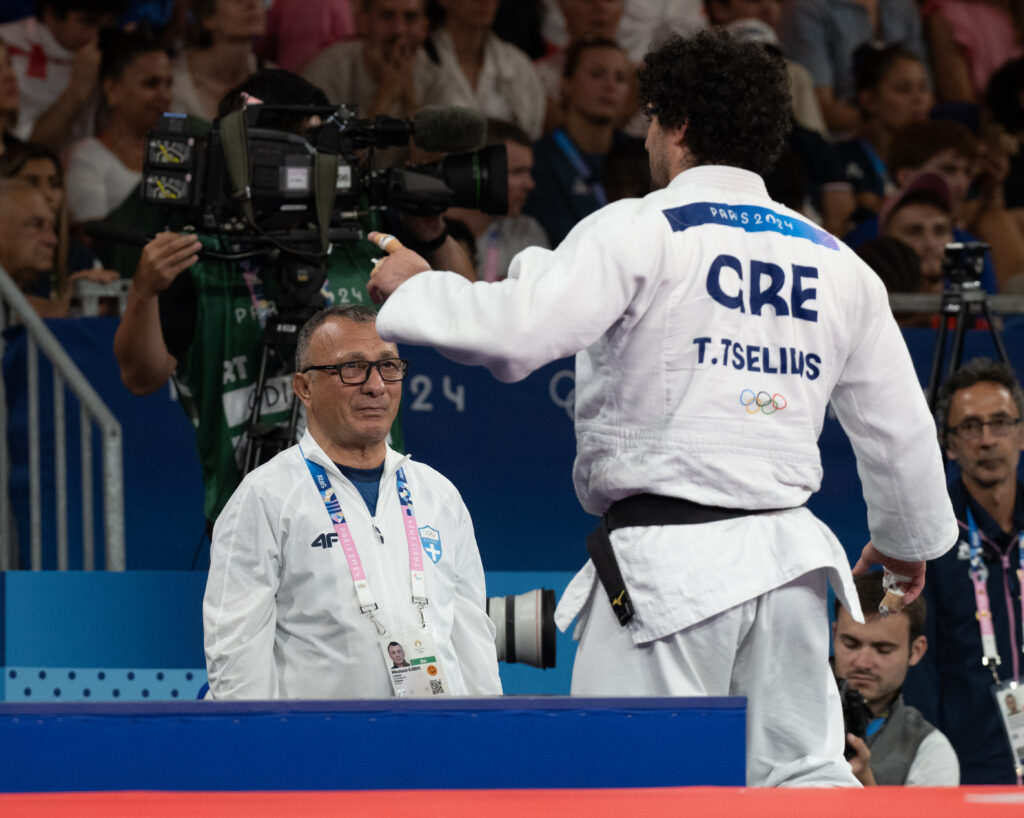
In preparing for the interview, I read that when you were younger, you were a big fan of Akimoto and Tchrikishvili. Why them?
At first, my favorite judoka after Ilias was Varlam Liparteliani. I saw his kata guruma in Chelyabinsk in the 2012 European Championship final against Grigorii Sulemin. Afterwards, I tried it myself, and I immediately felt it. It’s been my favorite throw ever since… The following year I started paying attention to another Georgian, Avtandili Tchrikishvili. And he immediately became my favorite athlete.
What did you like about him?
From him, I took this idea that you must know how to fight right and left. Everything Tchrikishvili did, he was able to do from both sides. The same style, right and left. So I also started practicing all my throws right and left. And to this day, thanks to Tchrikishvili, I repeat everything right and left. Even if I won’t necessarily launch the movement in competition, I need to feel it from the other side. This idea was, for me, very important.
French judo remembers him as Loïc Pietri‘s great rival at that time. He’s a judoka who exuded a lot of serenity.
Yes, I loved his attitude as an athlete. He was very calm. He never shouted, never showed emotions. Shouting, for me who was raised in the Caucasus, is the worst behavior there is. That’s why I liked his attitude.
And Hiroyuki Akimoto, then?
Him, I discovered even later, and he in turn became my favorite athlete. I was amazed at the way he fought. When he was in form, he left no opening for his opponents. He attacked the entire fight, it was incredible. I remember once when he was fighting against Israeli Sagi Muki. It was at the Tokyo Grand Slam. I counted: he did like fifteen attacks in a row. Right, left, seoi nage right, seoi nage left. From all sides. The pace was crazy. When Muki came out of that fight, he didn’t even know where he lived anymore… When I saw that, I said, oh, I want to fight like that. That’s when my desire to attack all the time, all the time, all the time was born. Give the opponent no chance… But I know I can’t reasonably hope to keep up his pace, because, you know, you need insane stamina to fight like that. And that’s not my case. But his approach still drives me. He’s my favorite judoka.
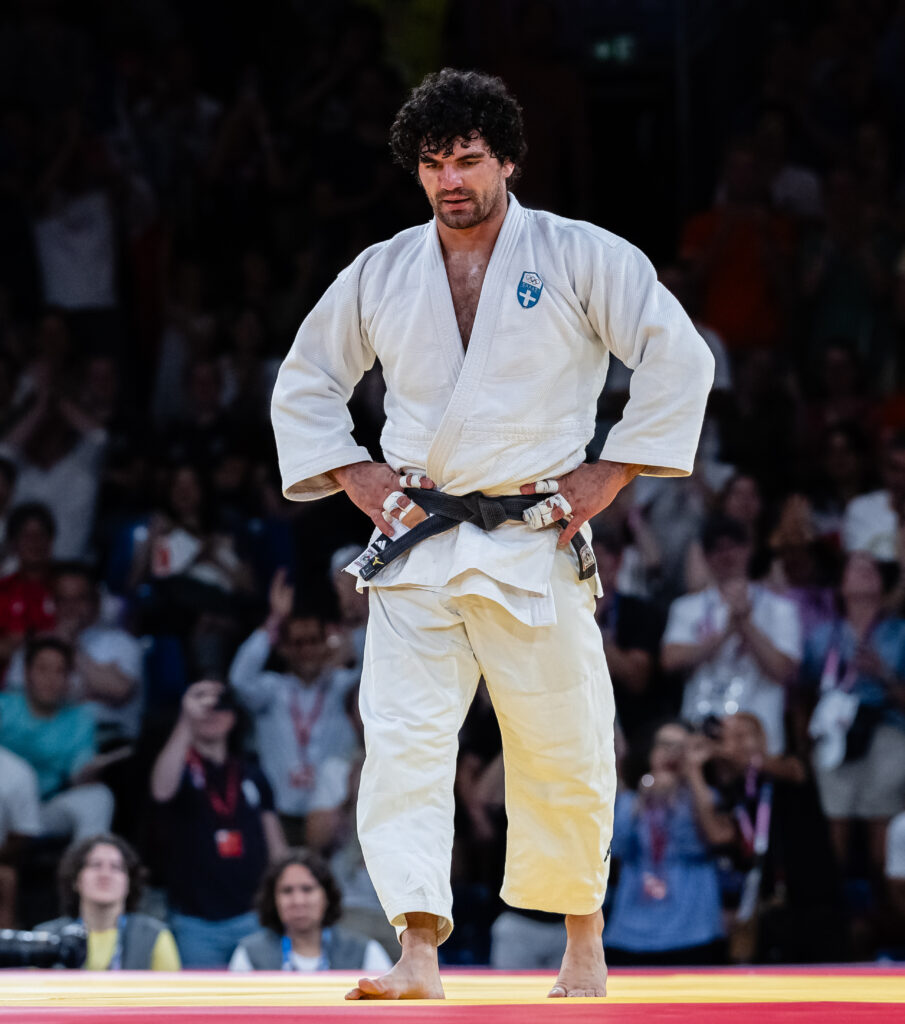
With your European medals and your Olympic podium, you have undoubtedly also become a role model for some judokas. What do you intend to leave them as a legacy?
You know, I’ve never felt like I was a talented judoka. I’ve never « felt » things. I’m a hard worker. To be good, I need to train a lot, both in terms of kumi kata and my throws. So if I have to pass on a message, it’s this: yes, it’s possible to take big medals even without great talent at the start. By relying especially on good tactics and a lot of training, you have your chances too. That’s the idea I want to show young athletes. Think, prepare yourself for each of your opponents, train to build yourself up physically and then you too will be able to take medals at the Olympics, European Championships or World Championships – a level where I don’t have a medal yet but it’s on my list.
And if you had to speak to the Fiodor who started judo at fourteen, what advice would you give him, fifteen years later?
Don’t try to copy everyone. Just take the best from them and forge your own style from there. At the beginning of my career, I just wanted to copy the best athletes, nothing more. I didn’t want anything from myself since I thought reproducing what others did was enough. Today I would say: take the good things from your role models but also think about finding your own style. Something that is unique to you and you alone.
When did you find your own style, by the way?
It was at the time of the Sofia Europeans, in 2022. I already had a glimpse in 2018, but it was after Sofia that I understood that, yes, I need to focus more on atypical techniques. My atypical judo remains my best chance to go get big medals. For others it’s unconventional judo. For me, it’s just mine. – Interview by Anthony Diao, summer-fall 2025. Opening picture: ©Paco Lozano/JudoAKD.
A French version of this interview is available here.
More articles in English:
-
- JudoAKD#001 – Loïc Pietri – Pardon His French
- JudoAKD#002 – Emmanuelle Payet – This Island Within Herself
- JudoAKD#003 – Laure-Cathy Valente – Lyon, Third Generation
- JudoAKD#004 – Back to Celje
- JudoAKD#005 – Kevin Cao – Where Silences Have the Floor
- JudoAKD#006 – Frédéric Lecanu – Voice on Way
- JudoAKD#008 – Annett Böhm – Life is Lives
- JudoAKD#009 – Abderahmane Diao – Infinity of Destinies
- JudoAKD#010 – Paco Lozano – Eye of the Fighters
- JudoAKD#011 – Hans Van Essen – Mister JudoInside
- JudoAKD#021 – Benjamin Axus – Still Standing
- JudoAKD#022 – Romain Valadier-Picard – The Fire Next Time
- JudoAKD#023 – Andreea Chitu – She Remembers
- JudoAKD#024 – Malin Wilson – Come. See. Conquer.
- JudoAKD#025 – Antoine Valois-Fortier – The Constant Gardener
- JudoAKD#026 – Amandine Buchard – Status and Liberty
- JudoAKD#027 – Norbert Littkopf (1944-2024), by Annett Boehm
- JudoAKD#028 – Raffaele Toniolo – Bardonecchia, with Family
- JudoAKD#029 – Riner, Krpalek, Tasoev – More than Three Men
- JudoAKD#030 – Christa Deguchi and Kyle Reyes – A Thin Red and White Line
- JudoAKD#031 – Jimmy Pedro – United State of Mind
- JudoAKD#032 – Christophe Massina – Twenty Years Later
- JudoAKD#033 – Teddy Riner/Valentin Houinato – Two Dojos, Two Moods
- JudoAKD#034 – Anne-Fatoumata M’Baïro – Of Time and a Lifetime
- JudoAKD#035 – Nigel Donohue – « Your Time is Your Greatest Asset »
- JudoAKD#036 – Ahcène Goudjil – In the Beginning was Teaching
- JudoAKD#037 – Toma Nikiforov – The Kalashnikiforov Years
- JudoAKD#038 – Catherine Beauchemin-Pinard – The Rank of Big Sister
- JudoAKD#039 – Vitalie Gligor – « The Road Takes the One Who Walks »
- JudoAKD#040 – Joan-Benjamin Gaba and Inal Tasoev – Mindset Matters
- JudoAKD#041 – Pierre Neyra – About a Corner of France and Judo as It Is Taught There
- JudoAKD#043 – Kim Polling – This Girl Was on Fire
- JudoAKD#044 – Kevin Cao (II) – In the Footsteps of Adrien Thevenet
- JudoAKD#045 – Nigel Donohue (II) – About the Hajime-Matte Model
- JudoAKD#046 – A History of Violence(s)
- JudoAKD#047 – Jigoro Kano Couldn’t Have Said It Better
- JudoAKD#048 – Lee Chang-soo/Chang Su Li (1967-2026), by Oon Yeoh
Also in English:
- JudoAKDReplay#001 – Pawel Nastula – The Leftover (2017)
- JudoAKDReplay#002 – Gévrise Emane – Turn Lead into Bronze (2020)
- JudoAKDReplay#003 – Lukas Krpalek – The Best Years of a Life (2019)
- JudoAKDReplay#004 – How Did Ezio Become Gamba? (2015)
- JudoAKDReplay#005 – What’s up… Dimitri Dragin? (2016)
- JudoAKDReplay#006 – Travis Stevens – « People forget about medals, only fighters remain » (2016)
- JudoAKDReplay#007 – Sit and Talk with Tina Trstenjak and Clarisse Agbégnénou (2017)
- JudoAKDReplay#008 – A Summer with Marti Malloy (2014)
- JudoAKDReplay#009 – Hasta Luego María Celia Laborde (2015)
- JudoAKDReplay#010 – What’s Up… Dex Elmont? (2017)
And also :
- JudoAKDRoadToLA2028#01 – Episode 1/13 – Summer 2025
- JudoAKDRoadToLA2028#02 – Episode 2/13 – Autumn 2025
JudoAKD – Instagram – X (Twitter).
